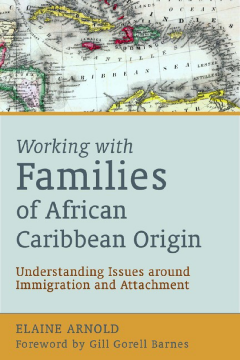
Additional Information
Book Details
Abstract
Many of those who emigrated from the Caribbean to the UK after World War II left behind partners and children, causing the break-up of families who were often not reunited for several years.
In this book, Elaine Arnold examines the psychological impact that immigration had on these families, in particular with relation to attachment issues. She demonstrates that the disruption caused by separation from both family and country often had long-term traumatic consequences. The book draws on two studies carried out by the author in 1975 and 2001. In the first, she interviewed mothers who had emigrated without their children, and in the second, children (now adults) who had been left behind and were later reunited with their parents.
This insightful book will assist all those working with people of African Caribbean origin in the UK to better understand their experiences and the impact that separation and loss has had on their lives. It is essential reading for social workers, counsellors, therapists and any other professionals working with families of African Caribbean origin.
(...) provide detailed and honest accounts of the difficulties that resulted from these broken attachments and the impact that this had on their lives. This book would be an interesting read for those students and practitioners working with children of an African Caribbean origin to gain a greater understanding into the traumatic effects that migration can have. The book highlights the importance of attachment theory and demonstrates the wider applicability of this in respect to family loss and its long term effects.
Play for Life
Elaine Arnold is Director of The Separation and Reunion Forum, UK, an organization dedicated to highlighting the traumatic effects of broken attachments, separation and loss. Elaine has previously worked as a teacher, lecturer, child care worker, counsellor and psychiatric social worker. Her interest in attachment issues and separation was first sparked in the late 1940s when teaching in a school in a children’s home in Trinidad and Tobago, which housed children for a number of reasons including the emigration of parents.
This is a well written, reflective and insightful reference book with some candid, often traumatic accounts of separation and loss.
Young Minds Magazine
I found this book both fascinating and poignant. Everyone working with African Caribbean families or refugee and migrant children would benefit from absorbing its fascinating and eye-opening contents.
Therapy Today
This is a timely book, well written and highlighting an often ignored causal factor from a psychological perspective. The understanding of loss and separation and the intergenerational transportation of trauma are critical to an understanding of potential solutions to the apparent disproportionately high numbers of African Caribbean men and women in mental health services. The strength of the book lies in the compelling combination of well articulated individual stories with extensive research evidence and theory. Elaine Arnold contributes fresh ideas and perspectives to the field of race and mental health.
Hári Sewell, Director of HS Consultancy, UK and author of Working with Ethnicity, Race and Culture in Mental Health
Arnold's book reminds us of these ideas and of the importance for probation practitioners of listening to those they supervise, to take a developmental history and to try to really understand where their clients are coming from. I believe that this book is not only useful for working with people of African Caribbean origin but with all those for whom circumstances have led to traumatic ruptures of their closest relationships.
Probation Journal
I celebrate the arrival of this book because it is a testimony to the resilience of the human spirit surviving against sometimes terrible odds. It links the socio-historical dimensions of Caribbean family life with the importance of a psychological underpinning of attachment and commitment of family members to one another, for good mental health and a sense of identity. Dr. Arnold gives testimony to the many ways in which families struggled to keep connections in the face of long absences and also looks at the cost for many mothers and children of their separation from one another.
From the Foreword by Gill Gorell Barnes, Honorary Senior Lecturer, Tavistock Clinic, UK and consultant family therapist
